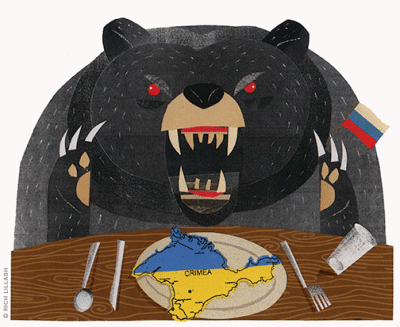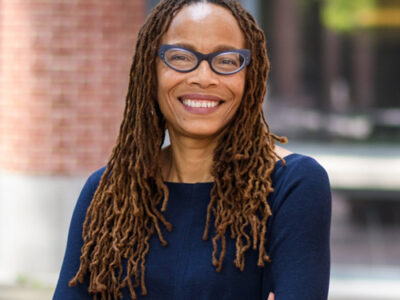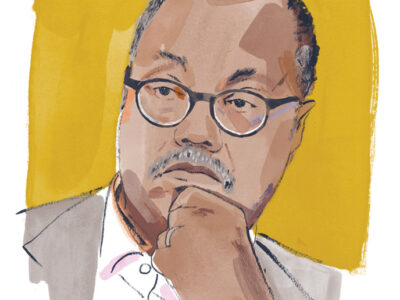
Thomas Childers, the Sheldon and Lucy Hackney Professor of History, introduced himself at a recent faculty roundtable on the current crisis in Ukraine with a reservation. “Anytime the Nazis, Hitler, or the Third Reich are invoked in any political conversation, no matter about what,” he said, “that’s the end of the discussion.”
The remark produced a mix of grumbling and nervous laughter from the audience, partly because many people believe the invocation of Nazi Germany may actually be justified in this case. For many in the West, the parallel between Russia’s annexation of Crimea and Nazi Germany’s 1938 occupation of the Sudetenland is no laughing matter.
On March 31, this sense of déjà vu filled the McNeil Center to standing-room capacity for an installment of the College’s “Knowledge by the Slice” series. A panel of historians and political scientists provided historical context and debated Vladimir Putin’s long-term agenda. Benjamin Nathans, the Ronald S. Lauder Endowed Term Associate Professor of History, speculated on Putin’s next move.
Thanks to an unusual confluence of events, we have some extremely good data on Putin’s thinking—namely, [his] op-ed piece published in The New York Times during the Syrian crisis and the 47-minute long speech in St. George’s Hall [in the Kremlin, in March], when he announced the annexation of Crimea. I urge you all to go to the website of the Russian foreign ministry and get the English version of that speech, because it is an extremely powerful, historically grounded speech, laying out the Kremlin’s position on Crimea and a host of other issues. If part of the educational mission at Penn is to open up students’ eyes to the ways other people in the world see the world, that’s a really good place to start.
Putin clearly is extremely irritated by the American doctrine of exceptionalism. He thinks that the United States is constantly preaching human rights and other international norms, but carving out a virtually hermetic place for itself where it can be simply behave according to its own Great Power interests. And he’s not entirely wrong, obviously.
The other thing about that speech, which I found alarming, is that he doesn’t just flag the illegitimacy of the 1954 transfer of Crimea from the Russian Republic (inside the Soviet Union) to the Ukrainian Republic (inside the Soviet Union)—he explicitly says that Russia has historical ties not just to Crimea but to large sections of eastern and southern Ukraine. Two years from now, if you want to go back and look: “Did Putin give any signals about the Russians wanting to go further than Crimea?” Yes, he did. He prepared the historical justificatory ground for going well beyond Crimea. That doesn’t mean he’s going to act on that, but the first layer of the pavement has been laid down.”




